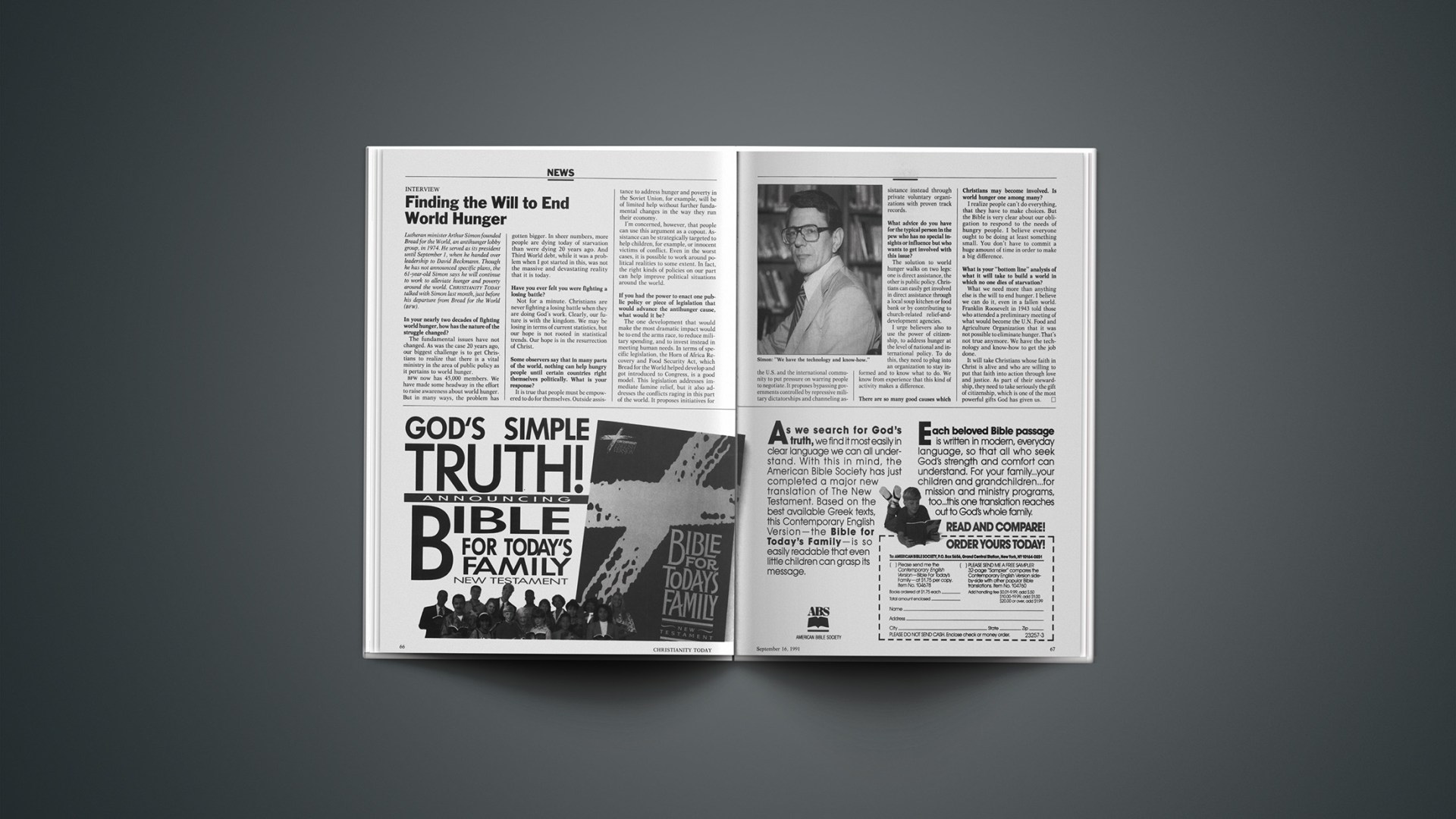Lutheran minister Arthur Simon founded Bread for the World, an antihunger lobby group, in 1974. He served as its president until September 1, when he handed over leadership to David Beckmann. Though he has not announced specific plans, the 61-year-old Simon says he will continue to work to alleviate hunger and poverty around the world. CHRISTIANITY TODAY talked with Simon last month, just before his departure from Bread for the World (BFW).
In your nearly two decades of fighting world hunger, how has the nature of the struggle changed?
The fundamental issues have not changed. As was the case 20 years ago, our biggest challenge is to get Christians to realize that there is a vital ministry in the area of public policy as it pertains to world hunger.
BFW now has 45,000 members. We have made some headway in the effort to raise awareness about world hunger. But in many ways, the problem has gotten bigger. In sheer numbers, more people are dying today of starvation than were dying 20 years ago. And Third World debt, while it was a problem when I got started in this, was not the massive and devastating reality that it is today.
Have you ever felt you were fighting a losing battle?
Not for a minute. Christians are never fighting a losing battle when they are doing God’s work. Clearly, our future is with the kingdom. We may be losing in terms of current statistics, but our hope is not rooted in statistical trends. Our hope is in the resurrection of Christ.
Some observers say that in many parts of the world, nothing can help hungry people until certain countries right themselves politically. What is your response?
It is true that people must be empowered to do for themselves. Outside assistance to address hunger and poverty in the Soviet Union, for example, will be of limited help without further fundamental changes in the way they run their economy.
I’m concerned, however, that people can use this argument as a copout. Assistance can be strategically targeted to help children, for example, or innocent victims of conflict. Even in the worst cases, it is possible to work around political realities to some extent. In fact, the right kinds of policies on our part can help improve political situations around the world.
If you had the power to enact one public policy or piece of legislation that would advance the antihunger cause, what would it be?
The one development that would make the most dramatic impact would be to end the arms race, to reduce military spending, and to invest instead in meeting human needs. In terms of specific legislation, the Horn of Africa Recovery and Food Security Act, which Bread for the World helped develop and got introduced to Congress, is a good model. This legislation addresses immediate famine relief, but it also addresses the conflicts raging in this part of the world. It proposes initiatives for the U.S. and the international community to put pressure on warring people to negotiate. It proposes bypassing governments controlled by repressive military dictatorships and channeling assistance instead through private voluntary organizations with proven track records.
What advice do you have for the typical person in the pew who has no special insights or influence but who wants to get involved with this issue?
The solution to world hunger walks on two legs: one is direct assistance, the other is public policy. Christians can easily get involved in direct assistance through a local soup kitchen or food bank or by contributing to church-related relief-and-development agencies.
I urge believers also to use the power of citizenship, to address hunger at the level of national and international policy. To do this, they need to plug into an organization to stay informed and to know what to do. We know from experience that this kind of activity makes a difference.
There are so many good causes which Christians may become involved. Is world hunger one among many?
I realize people can’t do everything, that they have to make choices. But the Bible is very clear about our obligation to respond to the needs of hungry people. I believe everyone ought to be doing at least something small. You don’t have to commit a huge amount of time in order to make a big difference.
What is your “bottom line” analysis of what it will take to build a world in which no one dies of starvation?
What we need more than anything else is the will to end hunger. I believe we can do it, even in a fallen world. Franklin Roosevelt in 1943 told those who attended a preliminary meeting of what would become the U.N. Food and Agriculture Organization that it was not possible to eliminate hunger. That’s not true anymore. We have the technology and know-how to get the job done.
It will take Christians whose faith in Christ is alive and who are willing to put that faith into action through love and justice. As part of their stewardship, they need to take seriously the gift of citizenship, which is one of the most powerful gifts God has given us.










